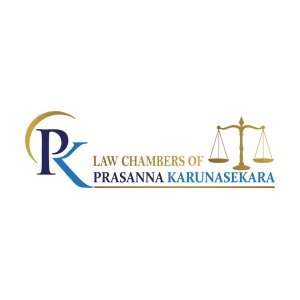Best Oil, Gas & Energy Lawyers in Kiribathgoda
Share your needs with us, get contacted by law firms.
Free. Takes 2 min.
List of the best lawyers in Kiribathgoda, Sri Lanka
About Oil, Gas & Energy Law in Kiribathgoda, Sri Lanka
In Kiribathgoda, Sri Lanka, the law governing oil, gas, and energy is based on national policies. The Sri Lankan government emphasizes sustainable use of energy resources, reducing environmental impact, and ensuring the country's energy security. As the regulatory framework is regularly updated to accommodate changes in energy trends and environmental concerns, a deeper understanding and compliance with the law in this sector can be complex.
Why You May Need a Lawyer
Whether you are an energy investor, an oil and gas company, or an involved community member, you may require a lawyer to navigate the complex field of oil, gas, and energy law. Lawyers can assist in drafting contracts, negotiating terms, ensuring regulatory compliance, handling disputes, securing permits, and navigating through any environmental issues that may arise.
Local Laws Overview
Key aspects of the local Sri Lankan law relevant to oil, gas, and energy include the Petroleum Resources Act No.26 of 2003 for exploration and production. Additionally, the Sri Lanka Sustainable Energy Authority, established by the Sri Lanka Sustainable Energy Authority Act No. 35 of 2007, promotes enabling policies for renewable and efficient energy use. Furthermore, the country also adheres to global environmental standards and climate commitments that impact the way energy business is conducted.
Frequently Asked Questions
1. Can I start an oil, gas, or energy business in Kiribathgoda, Sri Lanka?
Yes, you can start a business in this sector, but you need to secure necessary licenses and comply with national and local regulations. It is advisable to seek legal counsel prior to starting such a business.
2. How can I resolve a dispute related to the energy sector?
Disputes can be resolved through negotiation, court proceedings, or through arbitration. A lawyer experienced in the energy sector could advise best on course of action to take based on your individual case details.
3. What are the environmental obligations for energy companies?
Energy organizations are required to comply with various environmental regulations in order to minimize the environmental footprint. This may involve, for instance, conducting environmental impact assessments, meeting certain emission standards, and following best practices for waste management.
4. Can foreign companies invest in the energy sector in Kiribathgoda, Sri Lanka?
Yes, foreign companies can invest, but they must meet certain investment requirements and comply with all relevant regulatory standards.
5. Are there specific rules for renewable energy projects?
Yes, Sri Lanka has specific provisions related to renewable energy projects under the Sri Lanka Sustainable Energy Authority Act No. 35 of 2007, aimed at promoting cleaner and sustainable energy resources.
Addition Resources
For additional resources, consider the Petroleum Resources Development Secretariat, the Ministry of Power, and the Sri Lanka Sustainable Energy Authority. These organizations provide extensive resources and regulatory guidelines for oil, gas, and energy activities in Sri Lanka.
Next Steps
If you need legal assistance in the oil, gas, or energy sector in Kiribathgoda, Sri Lanka, the first step is to contact and engage a lawyer who has expertise in this field. They will be able to provide counsel based on your specific needs and circumstances and will guide you through the process required to advance in the sector in compliance with all relevant rules and regulations.
Lawzana helps you find the best lawyers and law firms in Kiribathgoda through a curated and pre-screened list of qualified legal professionals. Our platform offers rankings and detailed profiles of attorneys and law firms, allowing you to compare based on practice areas, including Oil, Gas & Energy, experience, and client feedback.
Each profile includes a description of the firm's areas of practice, client reviews, team members and partners, year of establishment, spoken languages, office locations, contact information, social media presence, and any published articles or resources. Most firms on our platform speak English and are experienced in both local and international legal matters.
Get a quote from top-rated law firms in Kiribathgoda, Sri Lanka — quickly, securely, and without unnecessary hassle.
Disclaimer:
The information provided on this page is for general informational purposes only and does not constitute legal advice. While we strive to ensure the accuracy and relevance of the content, legal information may change over time, and interpretations of the law can vary. You should always consult with a qualified legal professional for advice specific to your situation.
We disclaim all liability for actions taken or not taken based on the content of this page. If you believe any information is incorrect or outdated, please contact us, and we will review and update it where appropriate.








